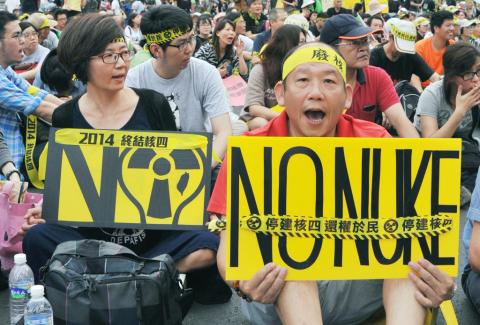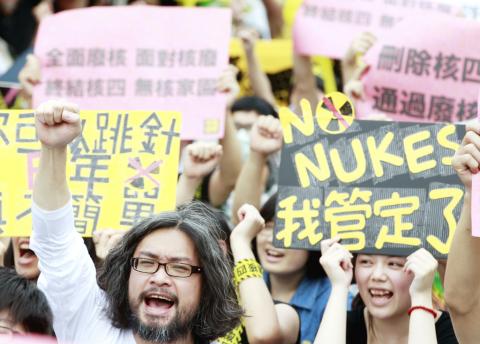Tens of thousands took to the streets of Taipei yesterday afternoon in an antinuclear protest that also occupied a section of Zhongxiao W Road in front of Taipei Railway Station.
At 3pm, Ketagalan Boulevard was packed with protesters wearing yellow ribbons that read: “Stop the Fourth Nuclear Power Plant. Give Power Back to the People,” as they listened to speeches and prepared to march.
Green Citizens’ Action Alliance chairperson Lai Wei-chieh (賴偉傑) said the government had threatened the public with increased electricity bills and weakening competitiveness if the nation gives up nuclear power, but he said that Germany — an example cited by the government — uses a different electricity price calculation model, has strong global competitiveness and has the most sustainable energy sector in the world.

Photo: Mandy Cheng, AFP
Taiwan Power Co’s (Taipower, 台電) data showed 197 components of the plant’s No. 2 reactor have been removed and installed into the No. 1 reactor, Lai said, adding that he did not trust the safety inspections being carried out by Taipower and the designer, General Electric Co.
“How can we feel safe about the plant?” Lai asked.
“We live in a beautiful country where you can reach the sea and the mountains in the same day, so why destroy such a beautiful place?” film director and frequent participant in antinuclear demonstrations Ko I-chen (柯一正) said. “If you [the government] cannot deal with nuclear waste, you should not create more.”

Photo: Pichi Chuang, Reuters
Former Democratic Progressive Party chairman Lin I-hsiung (林義雄), who is on hunger strike, represents the will of millions of Taiwanese, Ko said, adding that it is shameful that President Ma Ying-jeou’s (馬英九) administarion has treated him like “a child asking for candies.”
Green Citizens’ Action Alliance secretary-general Tsuei Su-hsin (崔愫欣) read out the protesters’ “non-cooperation movement” statement.
“We have two demands — stop construction of the Fourth Nuclear Power Plant, retire the operating plants as soon as possible and amend the ‘bird-cage’ Referendum Act (公民投票法),” Tsuei said. “Yet officials in power still neglect our demands, stall and shirk their responsibilities with excuses.”

Photo: Fang Pin-chao, Taipei Times
Holding signs reading: “I am a mother and against nuclear power,” several women said they formed a mothers’ group on Facebook when they saw students being injured by police officers during the forced eviction of protesters from the Executive Yuan last month.
“We treat all Taiwanese children as our children. How can we cower away and not protect them?” Sung Ya-chuan (宋雅娟) said.
Within an hour, the parade reached Zhongxiao W Road, where many protesters removed the center road blocks so that they could occupy both sides of the road and paralyze the traffic, triggering police to declare the protest illegal.
However, with protesters continuing to pack both sides of the road, riot police departed shortly afterwards, with the crowds applauding and cheering their departure.
Organizers sounded a simulated nuclear emergency warning siren and asked protesters to lay on the ground, mimicking the scene of a real nuclear disaster.
A woman surnamed Wang (王) from Greater Taichung said she first attended an antinuclear protest as a child in 2000 with her mother, and that now, as an adult, she wanted to protest because there is no safe way of dealing with nuclear waste.
A woman surnamed Wu (吳), a mother accompanied by her baby in a stroller, three-year-old son and husband, said they attended the parade because she cannot endure the government’s continued threats and its unwillingness to develop alternative energy sources. She said that the dangerous plants and nuclear waste should not be left for the next generation to deal with.
The organizers said those occupying Zhongxiao W Road plan to continue until at least tomorrow.
According to police estimates, more than 28,000 people took part in the rally, while the organizers said about 50,000 participated.
Meanwhile, in response to the Chinese Nationalist Party’s (KMT) announcement that it has agreed to halt construction of the Fourth Nuclear Power Plant’s No. 1 reactor and that No. 2 reactor would be “suspended,” antinuclear groups said that while they acknowleged the KMT’s decision, they do not accept it because the policy had not been announced by the Executive Yuan, but by the party.
“The announcement showed that the government cannot tell the difference between the KMT and the nation’s government,” Citizen of the Earth Taiwan’s Taipei Office director Tsai Chung-yueh (蔡中岳) said.
Separately, Chen Shang-chih (陳尚志), a National Chung Cheng University professor who is serving as Lin’s spokesperson during his hunger strike, also said Lin “would not respond to the decision of a political party.”
“It was a KMT meeting today. Why should we respond to a party? Mr Lin will not respond until the Executive Yuan orders constitutional action or the Legislative Yuan reaches a resolution,” Chen said.
Chen said Lin would continue his hunger strike.
Additional reporting by Chris Wang

CHAOS: Iranians took to the streets playing celebratory music after reports of Khamenei’s death on Saturday, while mourners also gathered in Tehran yesterday Iranian Supreme Leader Ayatollah Ali Khamenei was killed in a major attack on Iran launched by Israel and the US, throwing the future of the Islamic republic into doubt and raising the risk of regional instability. Iranian state television and the state-run IRNA news agency announced the 86-year-old’s death early yesterday. US President Donald Trump said it gave Iranians their “greatest chance” to “take back” their country. The announcements came after a joint US and Israeli aerial bombardment that targeted Iranian military and governmental sites. Trump said the “heavy and pinpoint bombing” would continue through the week or as long

TRUST: The KMT said it respected the US’ timing and considerations, and hoped it would continue to honor its commitments to helping Taiwan bolster its defenses and deterrence US President Donald Trump is delaying a multibillion-dollar arms sale to Taiwan to ensure his visit to Beijing is successful, a New York Times report said. The weapons sales package has stalled in the US Department of State, the report said, citing US officials it did not identify. The White House has told agencies not to push forward ahead of Trump’s meeting with Chinese President Xi Jinping (習近平), it said. The two last month held a phone call to discuss trade and geopolitical flashpoints ahead of the summit. Xi raised the Taiwan issue and urged the US to handle arms sales to

State-run CPC Corp, Taiwan (CPC, 台灣中油) yesterday said that it had confirmed on Saturday night with its liquefied natural gas (LNG) and crude oil suppliers that shipments are proceeding as scheduled and that domestic supplies remain unaffected. The CPC yesterday announced the gasoline and diesel prices will rise by NT$0.2 and NT$0.4 per liter, respectively, starting Monday, citing Middle East tensions and blizzards in the eastern United States. CPC also iterated it has been reducing the proportion of crude oil imports from the Middle East and diversifying its supply sources in the past few years in response to geopolitical risks, expanding

An Emirates flight from Dubai arrived at Taiwan Taoyuan International Airport yesterday afternoon, the first service of the airline since the US and Israel launched strikes against Iran on Saturday. Flight EK366 took off from the United Arab Emirates (UAE) at 3:51am yesterday and landed at 4:02pm before taxiing to the airport’s D6 gate at Terminal 2 at 4:08pm, data from the airport and FlightAware, a global flight tracking site, showed. Of the 501 passengers on the flight, 275 were Taiwanese, including 96 group tour travelers, the data showed. Tourism Administration Deputy Director-General Huang He-ting (黃荷婷) greeted Taiwanese passengers at the airport and